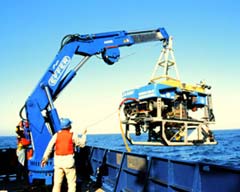Search Results for: ocean

New Generation Deep Ocean Vehicle Begins Science Operations for U.S. Researchers
JASON II reaches most of the world ocean floor and sends data ashore via the Internet
A new generation of remotely operated vehicle (ROV) capable of routine operation to depths of 6,500 meters (21,320 feet) and communicating its data back to shore via the Internet has been developed by the Woods Hole Oceanographic Institution (WHOI). The vehicle, JASON II, recently completed its first science cruise off the coast of Washington and Oregon and is currently at sea in the Pacific wo
Ocean temperatures affect intensity of the South Asian monsoon and rainfall
Warmer or colder sea surface temperatures (SST) may affect one of the world’s key large-scale atmospheric circulations that regulate the intensity and breaking of rainfall associated with the South Asian and Australian monsoons, according to new research from NASA.
A monsoon is a wind that changes direction with the seasons. Monsoons develop from changing patterns of atmospheric circulation which are caused by changes in heating and cooling of land and oceans. One of the strongest and most
Transition from El Niño to La Niña affected vegetation
NASA scientists using satellite data have shown that shifts in rainfall patterns from one of the strongest El Niño events of the century in 1997 to a La Niña event in 2000 significantly changed vegetation patterns over Africa.
Assaf Anyamba and Compton Tucker of NASA’s Goddard Space Flight Center, Greenbelt Md., and Robert Mahoney of Global Science and Technology Inc (GST) analyzed satellite derived images of vegetation from 1997 to 2000. They noticed regions of above normal “greenness” ov
Overfishing may diminish genetic diversity even when millions of fish remain
Populations of marine fish may lose genetic diversity even if fishing stops while there are still several million individuals – a number previously assumed to be enough to preserve a diverse gene pool.
Losing the diversity of key genes can render a population less productive and unable to adapt when faced with challenges such as global warming, pollution or changes in predators or prey. Rare genetic variation of little importance today might be the key to adaptability in the future, accordin
Geological Study Documents Changes in Coral Reefs
A recent study of coral formations in different tropical locations will be used to help geologists reconstruct climate and storm patterns of the past and learn more about the preservation of reefs. The findings will be presented by David Meyer, University of Cincinnati professor of geology, at the upcoming 2002 meeting and exposition of the Geological Society of America.
Meyer’s previous research established that coral reefs can be an index of the ocean’s health and are greatly impacted by
Life in a greenhouse world
What constrained the evolution of life during the very hot early Earth? Was a simple drop in temperature largely responsible for the emergence of cyanobacteria, a large and varied group of bacteria with chlorophyll that carry out photosynthesis in the presence of light and air with concomitant production of oxygen? Was it a reduction in carbon-dioxide levels?
Geochemist David Schwartzman of Howard University and Ken Caldeira of the Climate and Carbon Cycle Group at Lawrence Livermore Nation